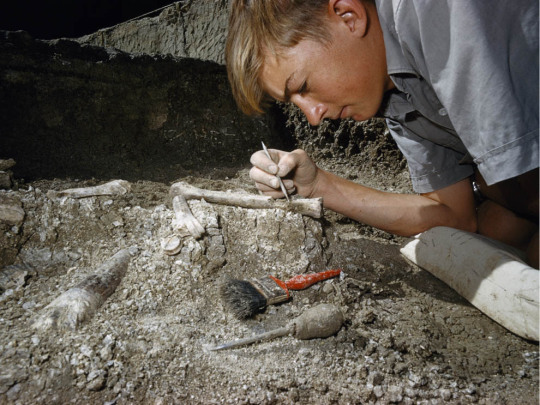Text
Unveiling Earth's Ancient Chronicles: The Fascinating World of Paleontology

In the vast tapestry of Earth's history, each layer of sediment holds secrets waiting to be unearthed. Paleontology, the science of studying fossils, serves as a portal to the ancient past, unraveling the mysteries of life that once thrived on our planet. It is a discipline that bridges the gap between the distant past and our modern understanding of biology, geology, and evolution.
At its core, paleontology is a detective story, where clues are preserved in the form of fossils, providing snapshots of ancient ecosystems and the creatures that inhabited them. These fossils range from the microscopic to the colossal, from delicate impressions of leaves to the towering skeletons of dinosaurs. Through meticulous excavation and analysis, paleontologists piece together the evolutionary history of life on Earth, tracing the lineage of species and deciphering the processes that shaped biodiversity over millions of years.
One of the most iconic figures in paleontology is the dinosaur. These magnificent creatures ruled the Earth for over 160 million years before meeting their demise in the mass extinction event at the end of the Cretaceous period. From the ferocious Tyrannosaurus rex to the gentle giants like Brachiosaurus, dinosaurs captivate our imagination and offer insights into prehistoric ecosystems. Through fossilized bones, footprints, and even traces of soft tissues, scientists reconstruct the behavior, physiology, and ecology of these ancient reptiles.
However, paleontología extends far beyond dinosaurs. It encompasses the study of all forms of ancient life, from the microscopic organisms that flourished billions of years ago to the majestic megafauna of the Ice Age. Fossils provide evidence of evolutionary transitions, such as the gradual emergence of mammals following the extinction of dinosaurs or the adaptive radiation of birds from their dinosaurian ancestors.
Moreover, paleontology intersects with other fields of science, contributing to our understanding of Earth's geological history and the processes that have shaped its surface over time. By examining fossilized plants, pollen, and isotopic compositions, researchers reconstruct past climates and environments, shedding light on how Earth's ecosystems have responded to changes in temperature, atmospheric composition, and sea level throughout geological epochs.
Furthermore, paleontology plays a crucial role in conservation biology and paleoecology by providing baseline data for understanding modern biodiversity and predicting future ecological trends. By studying the fossil record, scientists identify patterns of extinction and speciation, informing efforts to preserve endangered species and ecosystems threatened by human activities.
In essence, paleontology is not just the study of ancient life; it is a journey through time that deepens our appreciation for the interconnectedness of life on Earth. By unraveling the stories preserved in rocks and fossils, paleontologists illuminate the path of evolution, offering glimpses of the past and guiding our stewardship of the planet for future generations. As we continue to explore Earth's geological archives, the fossils we uncover will undoubtedly reveal new chapters in the epic saga of life's evolution.
1 note
·
View note